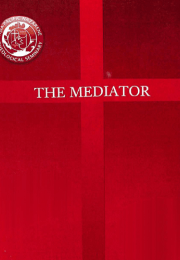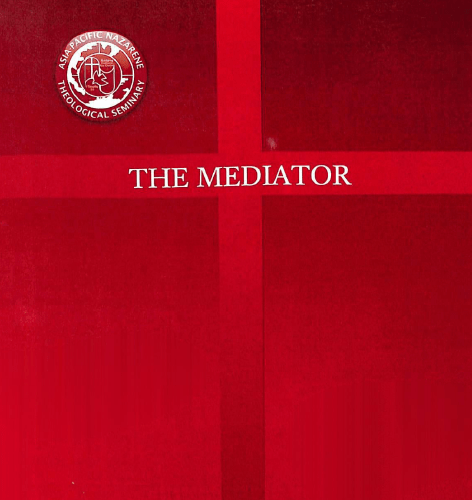- Resource Types
- Resource Languages
- Institutional Repository
 Visit the home page
Visit the home page
About Site Language
WHDL is viewable in multiple languages. Use the pull-down menu to select a language to view the site.
I changed my language, but I’m still seeing resources in the other languages?
If a resource or text has not been translated into your selected language, it will appear in the initially added language. We are always looking for help translating these resources. If you can help, contact us!
WHDL - 00012145


click to copy
Ackerman, D (2003). The Mediator - Volume IV Issue 2 April 2003 .
Ackerman, DavidThe Mediator - Volume IV Issue 2 April 2003 . , 2003
Ackerman, DavidThe Mediator - Volume IV Issue 2 April 2003 . , 2003
Ackerman, DavidThe Mediator - Volume IV Issue 2 April 2003 . , 2003
The papers presented in this issue of The Mediator confront us with this fundamental question: what difference does Jesus Christ make in our individual lives, churches, societies, and institutions? How we answer this question will determine a great deal about our direction and mission. Our answer will also say something about our view of the religious, political, and economic problems confronting us at every level. Won Keun Oh sets out for us the fundamental problem—sin. Sin separates us from God, resulting in alienation. As Paul writes. Sin entered the world through one man [Adam], and death through sin, and in this way ^ath came to all men because all sinned." A Rabbinic proverb goes, we each have become our own Adam.*' Paul puts it this way, "All have sinned and fallen short of the glory of God" (Rom 3:23). The fallen state impacts only our relationship with God but our relationships with creation. Robert Donahue offers a compelling look at racism. Sin causes us to devalue other humans, seeing others as "things" or objects to be used or discarded. Donahue's answer to racism is anchored squarely in scripture - reconciliation. God's solution to alienation is healing. Reconciliation describes the healing and restoration of broken relationships. Paul reminds the Corinthians in 2 Cor 5:18, "All this is from God, who "reconciled us to himself through Christ." Verse 19 then says God was reconciling the world to himself in Christ." We on our power cannot heal brokenness. We need outside divine help. A good definition of reconciliation is given in Roman 5:8. For God demonstrates His own love for us in this: while we were yet sinners, Christ died for us." Donahue ends his article by drawing attention to the real solution to racism: it is a change of heart by the sanctifying work of God. God transforms us through Christ who became sin for us, taking upon Himself our guilt and shame. Through His death and resurrection, the influence of sin is broken. Beverly Gruver picks up theme of transformation in her article on equality. It is only through the power of the Holy Spirit that can we submit in the strength to elevate our brother and sisters to places of dignity. We sell the Gospel short when we say that Jesus died simply so that we can be forgiven of our sins. The good news of the Bible is that Jesus Christ not only took upon Himself our fleshly sins but that He took upon Himself the heredity of sin. God made His own Son to be sin so that He might make the sinner a saint. The examples Gruver cites challenges us all to the affirmation shown by God. This blessed hope impacts all of our life. It will transform how we view our possessions (see Jojit Uy's interpretation of the Parable of the Rich Fool), and how we can use these possessions to help others (see Jerry Poter's sermon on Ministry to the Poor). We become the instruments of God in the world so that others can experience this new relationship. 2 Cor 5:20 reads, "We are Christ's ambassadors,as though God were making His appeal through us." The essential element to being effective bearers of the divine message of hope is our won intimate fellowship with Christ, allowing Him to guide and control our lives through total submission to Him. This message of holiness of heart and life can guide the mission of the church. Cynthia Datu challenges readers to offer this message of hope and holiness to middle-class Filipinos. Larnie Sam Tabuena reminds us that in a shifting age, we must place our confidence boldly in the Truth, Jesus Christ, who offers the answer for which the world is seeking. Satish Manmothe addresses one of the more intriguing questions of theology: the fate of the evangelized. The Wesleyan optimism of grace gives hope of transformation to all people, but people must respond to this grace with openess. Hitoshi Fukue's sermon looks to the future, which for those who are being transformed by this Gospel of Grace, is optimistic and bright. Readers of this issue will be challenged to view their worlds with a new awareness of the tranforming grace of God.
The copyright statement is available at the Mediator Committee editor.
25 Resources
The Mediator is the official journal of Asia-Pacific Nazarene Theological Seminary. The articles address both scholarly and practical issues relevant to ministry on this region. We have published our printed journal on this web site so that the dialogue may extend around the world. You will need the free Adobe Acrobat Reader to view some of the issues of our journal. You may down load this program by clicking on the icon to the right.
2019
2016
2017
2016
1901
2004
1899
1929
1920
1952
2019
2018
2020
1904